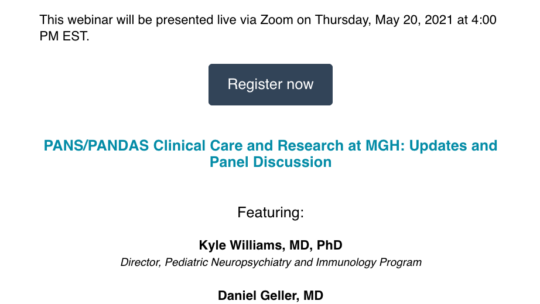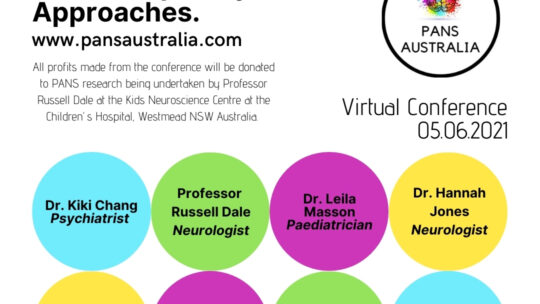Monthly Archives:
April 2021

ASPIRE to Move Mountains Together Bracelets Fundraiser
ASPIRE to Move Mountains Together Bracelets Why Move Mountains Together? PANS PANDAS is a rough road and a significant obstacle to overcome, and we need our community’s help to...

PANS/PANDAS Clinical Care and Research at MGH
Updates and Panel Discussion Please join doctors from the Mass General PANDAS clinic as they present updates on various aspects of clinical care in PANS/PANDAS. They will also present new research...

The Get Unstuck Parenting Summit
April 23-25 Your roadmap to breaking free from anxiety, ADHD, OCD, mood issues and behavioral problems I think we can all agree that we are living through difficult times… I...

PANS Australia Conference
The conference is for parents and professionals and is completely online so available world-wide. It will be recorded and available for viewing for ticket holders for a period of time after the...

Classic Sudden Onset OCD Seen in PANS PANDAS
My gut told me to keep digging because up until that day my daughter did not have this struggle and I knew OCD and ASD are not sudden onset. ...

Bowl of Light – A Lyme PANS Story
I have always been fascinated by the mystery, beauty and power of the mind. That is why I became a psychotherapist. Healing is not just an aspect of my career;...
Anorexia Nervosa Caused by Polymicrobial Tick-Borne Infections: A Case Study
Kinderlehrer DA. Anorexia Nervosa Caused by Polymicrobial Tick-Borne Infections: A Case Study. Int Med Case Rep J. 2021;14:279-287
https://doi.org/10.2147/IMCRJ.S311516
“Conclusion: There is increasing support for the role of infections in the genesis of AN in some patients. The data suggest that autoimmunity is playing a prominent role in the pathogenesis of microbial-induced AN, and that role has been elucidated in children and adolescents with PANS. This is the first documented case of Lyme borreliosis complicated by three co-infections triggering AN. This adds to the existing literature that infections can play a more prominent role in AN. The corollary is that physicians should become aware of this association in the evaluation of patients with AN, as it may provide a treatment option for this serious and sometimes fatal condition. The possibility that tick-borne infections could underlie the diagnosis of AN warrants further study.”

Ohio PANS PANDAS Updates
WE HAVE A CALL TO ACTION for House Bill #488 that requires insurance coverage for PANDAS/PANS kids in...

Supporting Someone with PANS PANDAS
These sage words of advice come from a girl with PANS/Autoimmune Encephalitis. She often allows people to ask her questions in her stories. One day a mom asked, how can...

Sharing Hope!
I share our story so you know you are not alone and full healing as possible! My dear daughter 13 is fully healed! I actually came home to this tonight. ...

Thank You to ASPIRE’s Volunteers!
ASPIRE Celebrates Volunteer Appreciation Week! ASPIRE volunteers are the heart of our organization, aiming to improve the lives of those affected by PANS PANDAS. Our different backgrounds and...